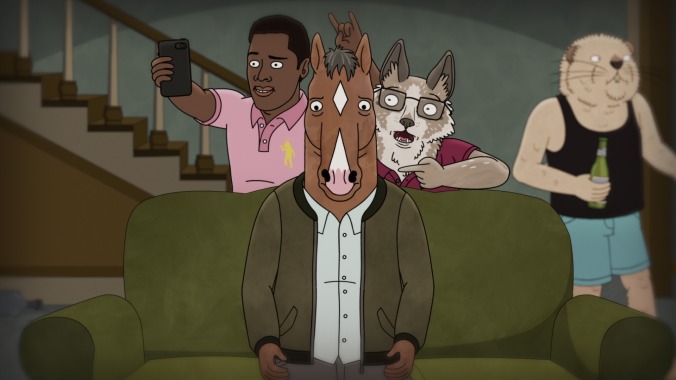BoJack Horseman’s final, unspoken f-bomb was the kindest “fuck” of all

There’s a rule—never explicitly codified by the show’s writers, but well-understood among its fans—that BoJack Horseman only ever employs a single use of the word “fuck” per season. It’s a matter of restraint, not Standards And Practices. (Considering that the show lived and died on the digital Wild West of Netflix, its TV-MA rating was always largely perfunctory, in any case.) And yet the rule stood, across six and a half seasons of funny animals and bitter depression: When someone in Hollywoo says “fuck” to someone else, they, and the writers, want that sentiment to land.
It’s a precedent that stretches all the way back to the show’s first-season stand-out, “The Telescope,” when Stanley Tucci’s Herb Kazzaz finishes his refusal to give BoJack the absolution he’s so desperately, pathetically craving with a definitive “Now get the fuck out of my house.” It’s the first time the show dialed in on one of its most carefully cultivated themes: That sometimes you can do something so bad that no measure of forgiveness is possible, reasonable, or warranted—and you’ve still got to go on living with the certainty of that ruined relationship intact.
Subsequent “fucks” would vary in intensity, intent, and effect—from Olivia Wilde’s barely contained “I’ll fucking kill you” in season two, to BoJack’s impotent fantasy of cutting ties with his dementia-addled mother in season four. But the power of the word, the ability to sever a connection, permanently, has always been respected from within the bounds of the show’s moral universe. When BoJack’s Philbert co-star Gina (Stephanie Beatriz) yells “What the fuck is wrong with you?” in the aftermath of his drug-addled assault against her, we know that that relationship is not just damaged, but dead. And it’s to Aaron Paul’s enduring credit that, after the happy-go-lucky Todd drops his own, weary f-bomb on BoJack in “It’s You,” there is always at least a hint of guardedness in his otherwise cheerful voice every time the two characters interact.
In light of all this, the absence of the word from the show’s final run of episodes, released on Netflix last Friday, feels significant. You could argue that Season Six already spent its allotment of “fucks” to give last year, when “A Quick One While He’s Away” put one in the mouth of one of Gina’s co-stars, elegantly illustrating the ways her BoJack-inflicted trauma has damned her to the Hollywood purgatory that the phrase “difficult actress” so painfully contains. But for a final half-season heavy with so many opportunities for a cutting of the ties—one in which the world, his loved ones, and BoJack himself all rise up in rejection of his existence—the fact that the word itself never appears is telling.
Instead, it filters in along the margins. The show spares us, for instance, the raw text of the letter BoJack receives from his half-sister Hollyhock, one in a series of living life-rafts he’s clung to over the years as a “reason” to finally get his shit under control. Instead, it allows us to infer the cut the letter carries from the fact that the first thing BoJack does after finally reading it is to smash his hard-won sobriety to pieces. (It’s hard to imagine the soft-spoken Hollyhock deploying the word itself in any case, but the intent is clearly there.) It spares us the moment when BoJack, in the midst of his latest pity-fueled bender, makes his most credible suicide attempt to date. (At the risk of indulging in fan-fiction, it’s painfully easy to imagine him whispering “Fuck you” to his reflection before throwing himself into that damned swimming pool at last.) And when Hollywoo itself turns on him, after getting a glimpse at the ugliness inside, it hurls rotten sandwiches, lawsuits, and all manner of invective at BoJack’s face—but never an angry, or ultimate, “Fuck you.” As his long-time friend and former lover Princess Carolyn notes in the show’s final episode, people are generally quick to forget, and rarely care enough to worry about whether they forgive, for so final a gesture to stick.
Which brings us, in roundabout fashion, to the show’s very final conversation, and the complex, twisted, persistent relationship that’s always often been closest to its heart: The one between BoJack and his friend, unrequited love interest, partner in crime, ghostwriter, enemy, conscience, and long-sought savior, Diane Nguyen. Like all four of the conversations that make up the body of “Nice While It Lasted,” it’s one that defies the pat narratives of the TV shows BoJack has modeled so much of his life around: Diane doesn’t offer him easy forgiveness for his latest, most painful attack on her own hard-earned happiness, when a drunken, awful voicemail left the responsibility for his suicide attempt somehow rotting at her feet. She doesn’t tell him she’ll always love him, or that she wishes they could have made it—whatever “it” might have been—work out. And she doesn’t say “Fuck you,” no matter how many times it might have been justified over the many years they’ve known each other, and that night most of all.
Instead, she says “Thank you.” She says it twice.
It’s the gentlest cut possible. But a cut, nevertheless, a severance, born not out of the self-preservation from which so many “fucks” have been wrought, but out of the knowledge that the BoJack Horseman chapter of Diane Nguyen’s life is now complete. It’s an acknowledgement that when things end, they don’t always have to end in anger. They can just end, with the survivors going their separate ways, changed, but not necessarily wounded by having been in each other’s lives. The bridge doesn’t have to burn; you can just stop crossing it. And in that way, Diane’s final “Thank you” might have been BoJack Horseman’s kindest “fuck” of all.